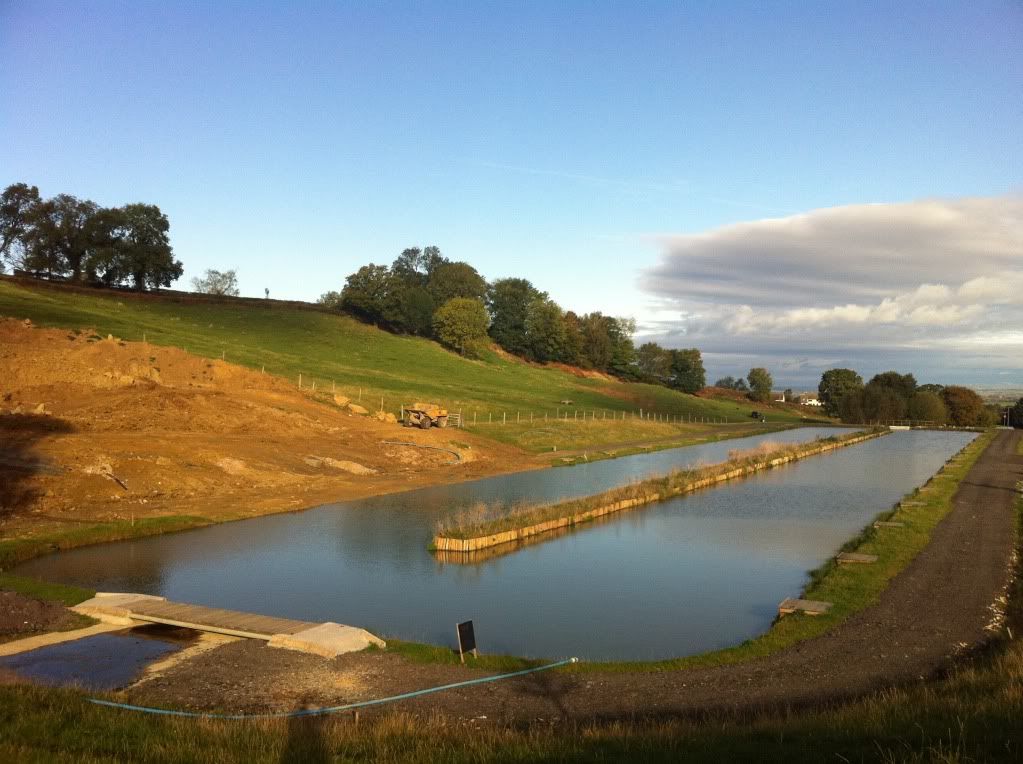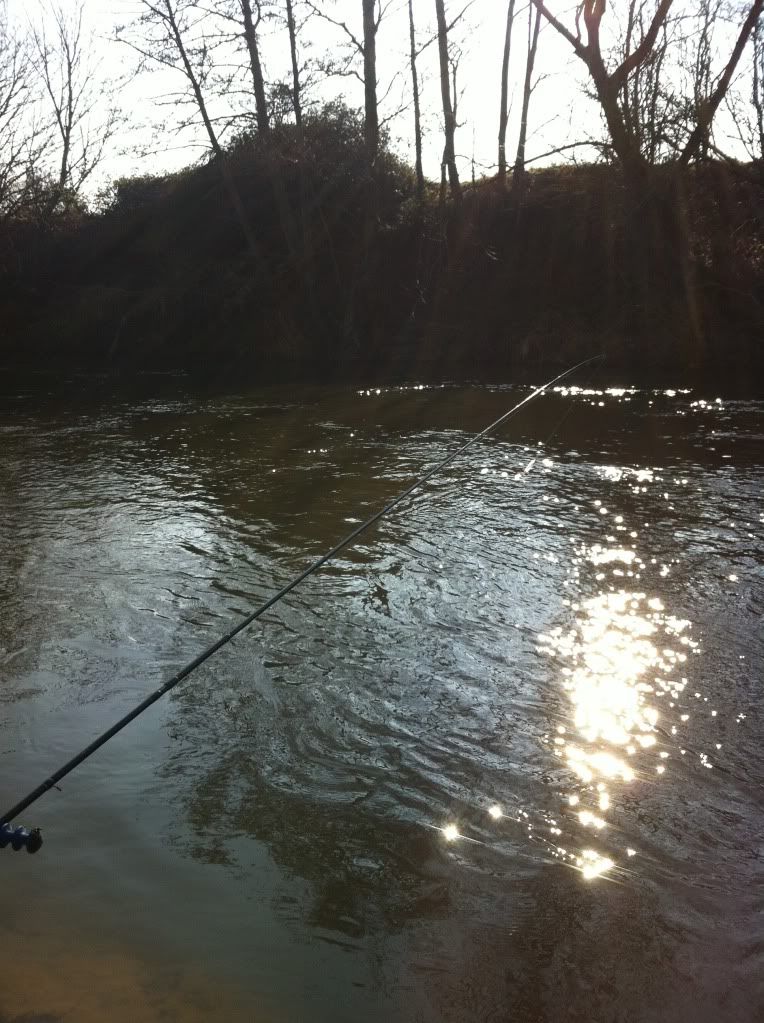Top: A carp match lake.
Bottom: A proper fishery, yesterday.
A few years ago I had a job requiring little effort, with an office to myself and unmonitored internet access. During the long, ennui-laden hours of my 'working' day I sometimes killed the time by posting provocative messages on various angling forums - come on, we've all done it...
A favourite topic was that old chestnut about the 'antis' and how we anglers should react to the possibility of the publics' view of fishing becoming hostile as a result of anti-angling lobbying. My argument was that the enormous amount of money generated by angling would prevent any prohibitive legislation; that the market would would be the arbiter over and above any moral concerns. I sensed the faint whiff of paranoia among those expressing anxiety over a perceived threat from those 'antis'. I was also (I confess it) attempting, in some mean spirited way, to wind up those posters. Some of their previous posts had had decidedly conservative (with a small "c", you'll note) undertones and I thought I'd be a smart-arse and try to beat them with their own free market stick. More often that not they took the bait and lively, light-hearted banter ensued. Unfortunately those halcyon days are long gone and, alas, I now have to work for a living.
Leafing through some old issues of Waterlog the other day I came across a Brian Clarke article entitled Fishing into the Future. In it, Clarke suggests that, "as things stand", angling is too popular to be in any danger. What I found interesting about this argument was that Clarke applied the importance of popularity to the non-angling publics' perception of fishing as well as that of anglers themselves. For Clarke, the guarantee against any future infringement of angling freedoms lay in the status quo - and it is important to bear in mind that this article was published in 1997 - remaining in place. That is, the perception of angling by non-anglers as "the rather dotty pastime being pursued by that man on the bank" alongside commercial interests remaining secondary to the core values, the "inner morality", as Clarke puts it, of angling. He singles out one threat to this equilibrium in particular: "If I had to point a finger, and I must, it would be at commercial stillwaters.". Clarke goes on to list now familiar concerns: overstocking, and the reliance on anglers' bait that this engenders; the importance placed upon weight and catch size; specific fish being caught repeatedly, or transported from fishery to fishery; depleted dissolved oxygen levels; the importance of competitive fishing to revenues, and so on.
The prescience of the article struck me. Fifteen years ago there were nowhere near as many commercial fisheries in the UK as there are now. I don't think it is too much to suggest that, in some parts of the country at least, commercial fisheries have become predominant, particularly where younger anglers are concerned. I have been saddened that, when fishing commecials (I know, I shall address the hypocrisy issue presently), I have had conversations with far too many youngsters who have never fished in any other environment. More often than before, non-anglers appear surprised that I fish, not in muddy puddles, but in rivers. Many of them seem to regard me as some kind of frontiersman because of this. Perhaps the most preposterous signifier of an emerging 'new angling' occurred when the oft-hooked celebrity carp Two-Tone's funeral featured in news media across the country.
Although I accept that there are fisheries that technically could be regarded as 'commercials' and that do not indulge in bad practise and/or exploitation, I have to say that, in my view, a great many of them do. The last straw for me came last year. Regular readers may recall that I meet up occasionally with a pal of mine who isn't, really, what you'd call a fisherman, but, rather, a chap who likes to go fishing from time to time. The upshot is that we generally met up at one of two commercials equidistant from our respective homes; a commercial, rather than a river, being his preference. I was concentrating on subduing a carp when it rolled on the surface, revealing the all too familiar torn mouth. Unbeknown to me the bloke who owned the place had arrived to get the day ticket money and was standing just behind me.
"Yeah", he said, without any irony whatever, "we bought some f****ed ones".
"Yeah", he said, without any irony whatever, "we bought some f****ed ones".
Frankly, I was appalled. The idea that there may be some seedy emporium where the telephone answering script might run something like: "Hello, f****ed fish dot com, how can we help you?" blew even my cynical mind. We made our excuses and left.
In light of this, and other experiences too depressing to mention, I renounce commercials and all their works. Anglers can vote with their feet and I intend to do just that; I shall never darken their net dips again. There are other reasons too. What about the impact on that mainstay of angling culture, the tackle shop? I was speaking with the proprietrix of the only remaining tackle shop in my home town the other day (there used to be quite a few) about this very subject. She was saying that more and more commercials do not allow bait to be brought onto their premises (why is that exactly?). The visits to on-site shops that this necessitates naturally results in them becoming the place where not only bait, but tackle too, is bought. She fears the tackle shop industry itself is in jeopardy: I believe her.
Maybe I'm naive in believing that young anglers should learn - and make their mistakes - on small streams where the impact of their relative ineptitude can be more readily and sustainably absorbed. Perhaps it is rather romantic of me to think it preferable that young anglers learn about the fauna and flora that flourishes in and around the environment of a healthy stream or river at the same time as learning about fishing. Naive, romantic or not, that's what I believe. It is how I introduce kids to fishing when I'm asked (which isn't often, thank god!).
I think Brian Clarke was right. If angling ceases to be perceived as that silly thing some chaps (and chapesses) do and comes to be thought of as something driven only by commercial interest then everybody loses; the anglers, the fish, and the environment which anglers, by their very existence, do so much to nourish and protect.
Acknowledgements:
Fishing into the Future by Brian Clarke (article) in Waterlog magazine, Editors, Chris Yates and Jon Ward-Allen, October/November 1997 (Issue No. 6).


4 comments:
An excellent article in every respect. I do fish commercials for perch from time to time as they are the one fish that seems to have taken up home and become something of a wild card there, culling the fry and growing very large on them. I see them as the only hope of them every reaching some kind of stable equilibrium over time.
The carp problem is vile though. I have caught accidental carp in such a parlous state that I just cannot imagine quite how they could have got in such a state. It beggars belief that one particular fish should have ended up with a mouth that was nothing more than an 18mm tube through which it sucked its food. It had no lips, no barbules, no mouth but that tiny hole, and it was a ten pounder too, a fish that should have a mouth capacious enough to put five fingers in. As it was, I could only insert my index finger. I no longer fish that place and never will again.
'All this' has been apparent to me from before the time when so called 'commercials' came into existence...just before I stopped fishing seriously.
Todays fisherman, is not brought-up on a diet of rivers, canals and lakes with naturally balanced fish populations, the result of at least decades (or centuries for rivers) of ecological interaction but on fantasy venues geared to massage the ego.
Today I read that there is a movement afoot trying to get otters culled to prevent them eating 'valuable' carp - words fail.
I am slowly trying to get some suitable gear together to have another concerted crack at angling after 10 years away and the thing that attracts me most is the whole ambience of the river or canal scene together with the occasional challenge of getting a bite in difficult circumstances.
[Enjoying reading the contemporary angling blogs by the way, and pleased to see so the small band out there amongst it making their own luck]
Jeff,
Thanks for the generous comments. I once saw a boy catch an enormous perch - well over 3lb - on a commercial. After unhooking it he picked it up and dropped it onto gravel from chest height before throwing it back in. I should imagine it died pretty soon afterwards from internal injuries. I think your blog's very good by the way.
Retiarius
George,
I agree that otterphobia is a worrying, and increasing, problem. Hopefully it doesn't lead to anything similar to that infamous magazine cover of a few years back depicting a hooded rifleman standing next to a pile of shot cormorants...
Retiarius
Good to see you blogging in earnest again.
Funniliy enough just read the same old Waterlog and agree completely - plus ça change, plus c’est la même chose.
Angters need to vote with their feet - I've given up a few waters that throw up the battle scarred and weary - perhaps it's voting with your wallet?
Post a Comment